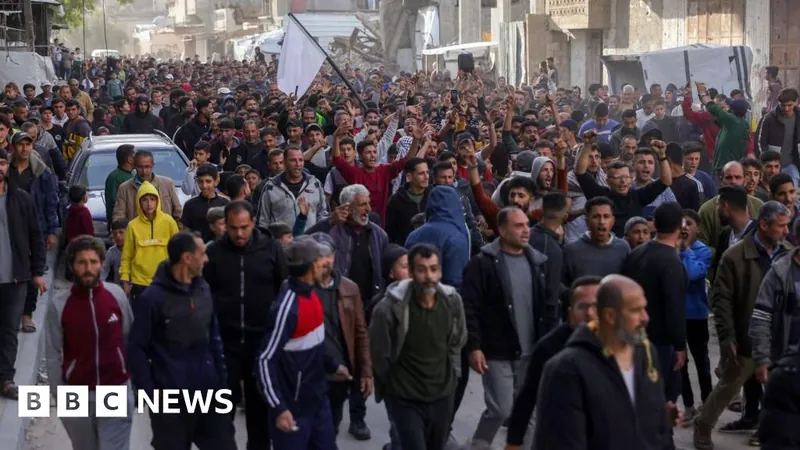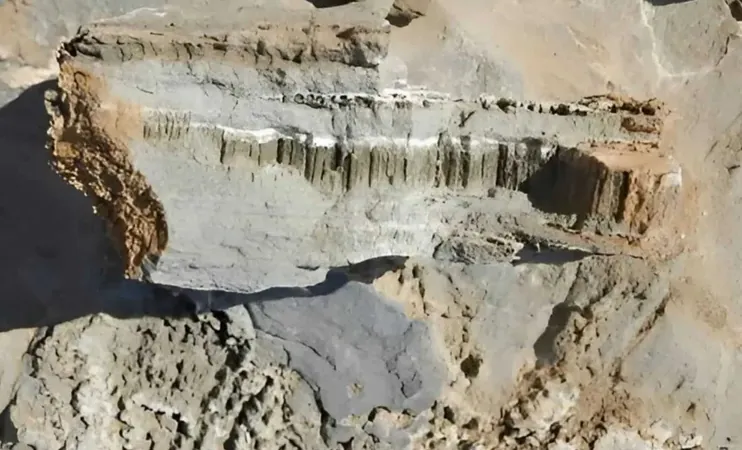
Historic Protests Erupt in Gaza Demanding Hamas Resignation Amid Ongoing Conflict
2025-03-26
Author: Sophie
In an unprecedented wave of dissent, hundreds have rallied in Gaza, marking the largest anti-Hamas demonstration since the onset of the current war with Israel. The protesters took to the streets to demand that the ruling group, Hamas, relinquish its hold on power.
Tensions escalated dramatically when masked Hamas militants intervened, some brandishing firearms, and others wielding batons to forcibly break up the protests. Graphic videos circulated across social media, showcasing groups of young men in Beit Lahia, Northern Gaza, chanting slogans such as "out, out, out, Hamas out," a clear call for change during these turbulent times.
Despite the growing discontent, Hamas has refrained from directly addressing the protests. In its defense, however, the group released a statement attributing the war's continuation to Israeli Prime Minister Benjamin Netanyahu's actions.
Supporters of Hamas have sought to downplay the significance of the demonstrations, labeling participants as traitors to the Palestinian cause. The protests ignited just a day after Islamic Jihad militants fired rockets into Israel, prompting the Israeli government to order evacuations in parts of Beit Lahia, stirring further unrest among local residents.
After nearly two months of tentative ceasefire, Israel resumed its military operations in Gaza, citing Hamas’s rejection of a recent U.S. proposal aimed at extending the truce. In turn, Hamas has accused Israel of failing to uphold prior agreements established in January.
The toll of resumed military actions has been devastating, with reports indicating that hundreds of Palestinians have lost their lives and thousands more have been displaced since Israel's airstrikes reignited on March 18. Eyewitness accounts like that of Mohammed Diab, a resident of Beit Lahia, reveal the personal costs of this conflict. Diab, whose home has been reduced to rubble and brother killed in an airstrike, voiced a poignant message: "We refuse to die for anyone, for any party's agenda or the interests of foreign states," demanding Hamas to heed the cries of those suffering from the violence.
The chants within Beit Lahia also echoed dissatisfaction with the broader Muslim Brotherhood leadership, a reflection of the deep-seated frustration among many residents who have endured years of conflict. Hamas has maintained unilateral control over Gaza since its electoral victory in 2006, exacerbating grievances against its governance.
As criticism of Hamas swells both in public and digital spheres, it remains challenging to measure the depth of support for the group amidst predominant fears of reprisal for dissent. Increased opposition was evident even before the recent hostilities erupted, suggesting that years of simmering resentment may finally be surfacing amidst the chaos.
Voicing this sentiment on social media, Mohammed Al-Najjar from Gaza expressed the collective anguish: "Excuse me, but what exactly is Hamas betting on? They're betting on our blood, blood that the whole world sees as just numbers. Even Hamas counts us as numbers. Step down and let us tend to our wounds."
The ongoing war in Gaza was sparked by Hamas's attack on Israel on October 7, which resulted in the death of roughly 1,200 individuals, primarily civilians, with 251 taken hostage. Israel has retaliated with a strategic offensive aimed at dismantling Hamas, leading to reported casualties exceeding 50,000 Palestinians, according to the Hamas-run health ministry.
The humanitarian crisis has reached alarming proportions, with a staggering 70% of buildings in Gaza either damaged or crushed. The healthcare, water, and sanitation systems have crumbled under pressure, leaving Gaza’s estimated 2.1 million residents grappling with severe shortages of food, fuel, essential medical supplies, and safe shelter. As this tumultuous chapter unfolds, the world watches anxiously, wondering how far the voices of dissent in Gaza will resonate and what the future holds for the beleaguered region.









 Brasil (PT)
Brasil (PT)
 Canada (EN)
Canada (EN)
 Chile (ES)
Chile (ES)
 Česko (CS)
Česko (CS)
 대한민국 (KO)
대한민국 (KO)
 España (ES)
España (ES)
 France (FR)
France (FR)
 Hong Kong (EN)
Hong Kong (EN)
 Italia (IT)
Italia (IT)
 日本 (JA)
日本 (JA)
 Magyarország (HU)
Magyarország (HU)
 Norge (NO)
Norge (NO)
 Polska (PL)
Polska (PL)
 Schweiz (DE)
Schweiz (DE)
 Singapore (EN)
Singapore (EN)
 Sverige (SV)
Sverige (SV)
 Suomi (FI)
Suomi (FI)
 Türkiye (TR)
Türkiye (TR)
 الإمارات العربية المتحدة (AR)
الإمارات العربية المتحدة (AR)